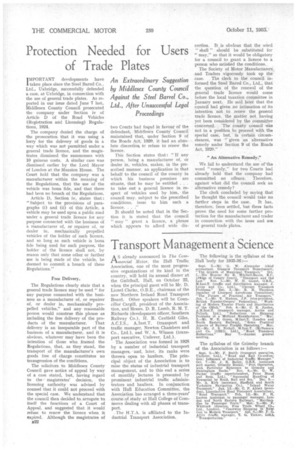Protection Needed for Users of Trade Plates
Page 36

If you've noticed an error in this article please click here to report it so we can fix it.
An Extraordinary Suggestion by Middlesex County Council Against the Steel Barrel Co., Ltd., After Unsuccessful Legal Proceedings
IMPORTANT developments have taken place since the Steel Barrel Co., Ltd., Uxbridge, successfully defended a case, at Uxbridge, in connection with the use of general trade plates. As reported in our issue dated June 7 last, Middlesex County Council prosecuted the company under Section iv of Article D of the Road Vehicles (Registration and Licensing) Regulations, 1924.
The company denied the charge of the prosecution that it was using a lorry for the delivery of goods in a way which was not permitted under a general trade licence, and the magistrates dismissed the summonses with 10 guineas costs. A similar case was dismissed earlier by the Lord Mayor of London at the Mansion House. The Court held that the company was a manufacturer within the meaning of the Regulations, that the use of the vehicle was bona fide, and that there had been no breach of the Regulations.
Article D, Section iv, states that : " Subject to the provisions of paragraphs (i) and (ii) of this Article, a vehicle may be used upon a public road under a general trade licence for any purpose connected with the business of a manufacturer of, or repairer of, or dealer in. mechanically propelled vehicles of the holder of such licence, and so long as such vehicle is bona fide being used for such purpose, the holder of the licence shall not, by reason only that some other or further use is being made of the vehicle, be deemed to commit a breach of these Regulations."
Free Delivery.
The Regulations clearly state that a general trade licence may be used " for any purpose connected with the business as a manufacturer of, or repairer of, or dealer in, mechanically propelled vehiCles," and any reasonable person would construe this phrase as including the free delivery of the pro ducts of the mants,facturer. That delivery is an inseparable part of the business of a manufacturer, and it is obvious, whatever may have been the intention of those who frarried the Regulations, that, as they stand, the transport of the manufacturer's own goods free of charge constitutes no transgression of the conditions.
The solicitors to Middlesex County Council gave notice of appeal by way of a case stated, but, having regard to the magistrates' decision, the licensing authority was advised by counsel that it could not proceed with the special case. We understand that the council then decided to arrogate to, itself the functions of a Court of Appeal, and suggested that it would refuse to renew the licence when it. expired. Although the magistrates of B22 two Courts had found in favour of the defendant, •Middlesex County Council. maintained that, under Section 0 of the Roads Act; 1920, it had an absolute discretion to refuse to renew the licence, This Section states that : "If any person, being a manufacturer of, or dealer in, vehicles, makes, in the prescribed manner, an application in that behalf to the council of the county in which his business premises are situate, that he may be entitled . . . to take out a general licence in respect of vehicles used by. him, the council may. subject to the prescribed conditions, issue to him such a licence. . ."
It should be noted that in the Section it is stated that the council " may " grant a licence, a phrase which appears to afford wide dis
cretion. It is obvious that the AV:ord 'shall " should be substituted for "may," so that it would be obligatory for a council to grant a licence to a person who satisfied the conditions. The Society of Motor Manufacturers , and Traders vigorously took up the case. The clerk to the council. informed the Steel Barrel Co., Ltd., that the question of the renewal of the general trade licence would come before the local taxation committee in January next. He said later that the comicil had given no intimation of its intention not to renew the general trade licence, the matter not having yet been considered by the committee concerned. The county council was not in a position to proceed with the special ease, but, in .certain circumstances, was " given an alternative remedy under Section 9 of the Roads Act, 1920."
"An Alternative Remedy."
We fail to understand the use of the word "remedy." for two Courts had already held that the company had committed no offence. Therefore, against what did the council seek an alternative remedy?
The clerk concluded by saying that he thought the council would take no further steps in the case. It has,. therefore, been settled, but thess facts prove the need for some further protection for the manufacturer and trader in connection with the issue and use . of general trade plates.




























































































